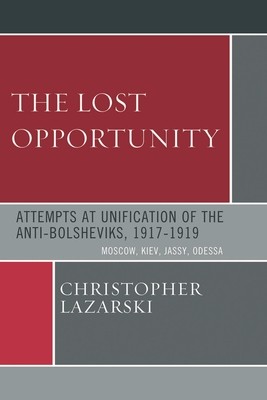
- We will send in 10–14 business days.
- Author: Christopher Lazarski
- Publisher: University Press of America
- ISBN-10: 0761841199
- ISBN-13: 9780761841197
- Format: 15.2 x 22.9 x 1.4 cm, hardcover
- Language: English
- SAVE -10% with code: EXTRA
Reviews
Description
The term "White movement" is commonly associated with the military struggle against the Soviet regime pursued by various anti-Bolshevik armies. Such a perception of the movement neglects the considerable effort undertaken by Russian political elites to organize political opposition to Bolshevik power. Acting through several multiparty organizations, these elites repeatedly attempted to form a common anti-Bolshevik front, to restore an all-Russian government and to liberate Russia from the Bolsheviks. In The Lost Opportunity, Lazarski explores these facets of the anti-Bolshevik struggle, which have been almost entirely ignored by historical scholarship. If we consider that the men and women who composed those elites were the most active and dynamic group in Russian civil society that neglect is striking. Their main task-the restoration of an all-Russian government-was of utmost importance for the anti-Bolsheviks, whose main centers were located on the peripheries of the Russian Empire and often had contradictory goals. Due to the paucity of interest in the activity of White political elites, this book is a pioneering study.
EXTRA 10 % discount with code: EXTRA
The promotion ends in 20d.22:07:17
The discount code is valid when purchasing from 10 €. Discounts do not stack.
- Author: Christopher Lazarski
- Publisher: University Press of America
- ISBN-10: 0761841199
- ISBN-13: 9780761841197
- Format: 15.2 x 22.9 x 1.4 cm, hardcover
- Language: English English
The term "White movement" is commonly associated with the military struggle against the Soviet regime pursued by various anti-Bolshevik armies. Such a perception of the movement neglects the considerable effort undertaken by Russian political elites to organize political opposition to Bolshevik power. Acting through several multiparty organizations, these elites repeatedly attempted to form a common anti-Bolshevik front, to restore an all-Russian government and to liberate Russia from the Bolsheviks. In The Lost Opportunity, Lazarski explores these facets of the anti-Bolshevik struggle, which have been almost entirely ignored by historical scholarship. If we consider that the men and women who composed those elites were the most active and dynamic group in Russian civil society that neglect is striking. Their main task-the restoration of an all-Russian government-was of utmost importance for the anti-Bolsheviks, whose main centers were located on the peripheries of the Russian Empire and often had contradictory goals. Due to the paucity of interest in the activity of White political elites, this book is a pioneering study.


Reviews